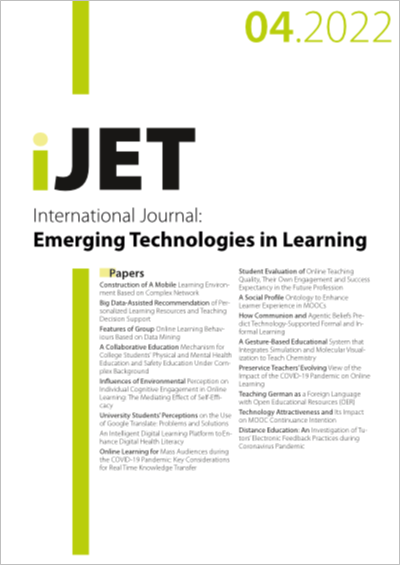How Communion and Agentic Beliefs Predict Technology-Supported Formal and Informal Learning
The Implications for Educational Technology
DOI:
https://doi.org/10.3991/ijet.v17i04.27249Keywords:
Higher education, Educational technology, Socio-cultural theory, Informal learning, Formal learning, Agency and communion, Self-regulated learningAbstract
Recent pandemic circumstances facilitated a rapid shift to online learning. The home and school environments are now intertwined, so the connection of formal and informal environments is inevitable. The studies of online learning resources (OLR) use before the pandemic shed light on studies of pandemic school-home learning nexus. This paper examines the higher edu-cation situation before the pandemic. We discuss students’ use (N = 1323) of technology in learning in light of the role of educational technology, taking a socio-cultural perspective of learning in the broader context of formal and informal socio-cultural contexts and practices of interaction with humans and tools. An analysis of OLR identified three factors. The first two factors involved overlapping formal and informal learning, while the third was clearer collaboration and interaction for formal learning. The three factors were analysed using hierarchical regression to assess predictors for technolo-gy use, focussing on three factors. (1) Beliefs about learning with technolo-gy, examined within the two-dimensional structure of agency and commun-ion. (2) Self-regulated learning, which is critical for informal learning and al-so received significant attention in formal learning. Since it is claimed that teachers are not ready for integrating informal learning, we examined (3) teachers as role models as predictors of ICT use in learning. Finally, (4) since obstacles were among the primary critical factors in previous related studies, we examined whether they still have predictive power. The findings indicate that communion and agentic beliefs are the strongest predictors.
Downloads
Published
2022-02-28
How to Cite
Istenic, A., & Lebenicnik, M. (2022). How Communion and Agentic Beliefs Predict Technology-Supported Formal and Informal Learning: The Implications for Educational Technology. International Journal of Emerging Technologies in Learning (iJET), 17(04), pp. 171–193. https://doi.org/10.3991/ijet.v17i04.27249
Issue
Section
Papers
License
Copyright (c) 2022 Andreja Istenic, Maja Lebenicnik

This work is licensed under a Creative Commons Attribution 4.0 International License.


